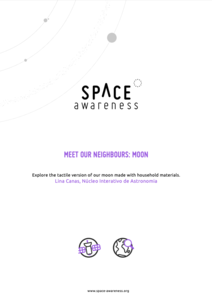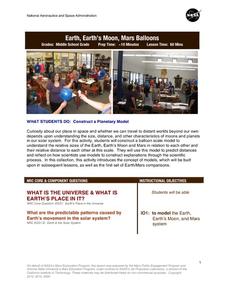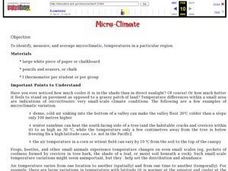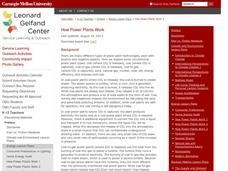Illustrative Mathematics
Growing Bean Plants (Grade 2)
After planting a bean seed in a jar, young scientists observe the growth patterns over several days. As the bean becomes a sprout, and the sprout becomes a plant, partners measure and plot the data. They notice patterns, practice...
DiscoverE
Touch Down
Protect the marshmallows! Groups create contraptions that will keep marshmallows in a cup, even after dropping them from a certain height. This is a fun way to model the shock-absorbing capabilities of spacecraft.
Science 4 Inquiry
The Impact of the Sun and Moon on Tides
In 150 BC, Seleucus of Seleucia theorized that the moon causes the tides. Scholars learn about what causes tides by studying the interactions of gravity between the sun, moon, and Earth. They use technology to formalize otherwise...
Kenan Fellows
Electricity: Sources, Usage, Challenges, and the Future
What does the future of energy look like? Junior engineers collaborate to discover a solution to the global energy crisis during a very hands-on lesson. The unit focuses on learning through collaboration to develop a deep understanding...
North American Montessori Center
Sun and Moon Autumnal Equinox Activities
Two hands-on activities celebrate the sun and moon autumnal equinox. First, scholars create a cairn using a shoebox, flashlight, and drawing tools to view the sun's progression. Second, learners take to the kitchen to bake mooncakes and...
Mascil Project
Closed Greenhouses
Controlling the efficiency of a greenhouse is a mathematical task. A collaborative project challenges learners to create an efficiency plan for a closed greenhouse. Using algebraic equations, they consider a set of constraints, design...
NASA
Development of a Model: Analyzing Elemental Abundance
How do scientists identify which elements originate from meteorites? Scholars learn about a sample of material found in a remote location, analyzing the sample to determine if it might be from Earth or not. They study elements, isotopes,...
Alliance Theater
The Jungle Book Post-Show STEAM Lesson
An ecosystem is really just the flow of energy through many different living organisms. A study of Rudyard Kipling's The Jungle Book leads to an environmental science activity in which learners study how various factors can affect...
Serendip
Changing Biological Communities – Disturbance and Succession
After cutting down a forest to make a farm, how long would it take the environment to turn an abandoned farm back into a forest? Scholars study this exact scenario while they interpret many charts and graphs of the changing ecosystems as...
Space Awareness
Meet Our Neighbors: Moon
Since a field trip to the moon isn't possible, bring the moon to young astronomers! Participants use everyday materials to create models of the moon and represent the features on its surface. The materials serve as a tactile as well as a...
NASA
Earth, Earth’s Moon, Mars Balloons
Very specific diameters are given for blowing up three different balloons to represent, in scale, the moon, Earth, and Mars. In groups of three, amateur astronomers explore scale measurements and distance in space.
Curated OER
Micro-Climate
Atmosphere aces investigate the microclimates that exist within a larger area. They use a thermometer to record the varying temperatures and identify the microclimates on a map that they have drawn. This exercise helps them to understand...
Curated OER
Gallery Walk Questions on Earth's Radiation Balance
Questions that can be used in a lesson on Earth's radiation balance are suggested in this resource. It is not a lesson plan, per se, but it is a list of questions for stations within a "Gallery Walk" lesson. The link to how Gallery Walks...
National Center for Case Study Teaching in Science
The Zarkah Stone
Astronomy stars read the account of the Zarkah meteorite that struck thickly populated Park Forest, Chicago in 2003. In doing so, they differentiate between meteors, meteorites, and meteoroids. They will also be able to explain...
Curated OER
Introduction to Conics
Just exactly where does the name conic come from? This brief hands-on exploration explains it all. Have your class cut cones to create their own conics, then assess their understanding with a few identification problems. Consider making...
Carnegie Mellon University
How Power Plants Work 1
First of three lessons, this is a great start to a unit on energy. As you demonstrate, learners discover different types of energy and how it is converted from one form to another. They then focus in on the generation of electricity by...
Carnegie Mellon University
How Power Plants Work 2
In this second of three lessons on power plants, future engineers find out how we generate electricity and how coal-powered plants operate. They work in small groups to make electromagnet generators to light LED bulbs. A set of...
Carnegie Mellon University
How Power Plants Work 3
Double, double toil and trouble, fire burn and cauldron bubble! Find out what drives a turbine to generate electricity and whether or not it has an impact on the environment. A discussion and lecture is divided by a hands-on activity in...
Virginia Department of Education
Hurricanes: An Environmental Concern
Hurricanes, typhoons, and tropical cyclones are the same type of storm, but their names change based on where they happen. Scholars use a computer simulation to learn about hurricanes. Then they hypothesize ideas to prevent hurricanes...
Other popular searches
- Solar System
- Solar System Crossword
- Solar Eclipse
- Solar Energy
- Solar Power
- Solar System Worksheets
- Solar System Word Search
- Solar System Art
- The Solar System
- Solar System Lesson Plans
- Solar System Math
- School Projects Solar System




















